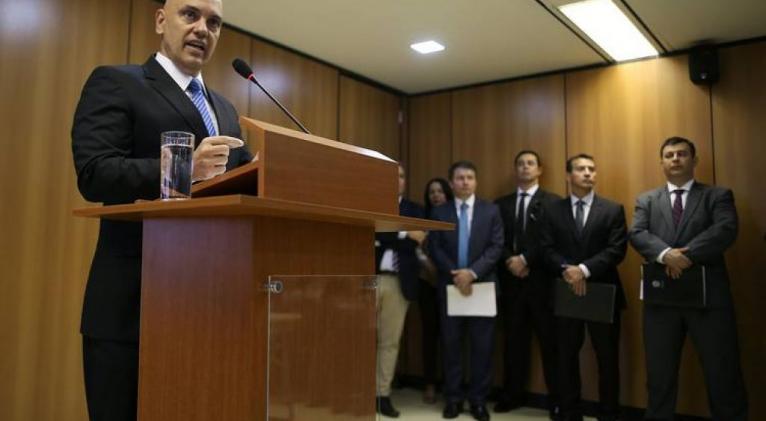Brazil Arrests 10 Suspected of Plotting Attacks Timed for Olympics
especiales

SÃO PAULO—Brazil’s federal police arrested 10 Brazilians they said were linked to Islamic State and planning terrorist acts during the Olympic Games in Rio de Janeiro.
Justice Minister Alexandre de Moraes, who oversees the federal police, described the suspects as poorly organized and said most of them knew each other only through online messaging. The target of their alleged attacks wasn’t clear, he said Thursday, adding, “It was an amateur cell without any planned preparation.”
The arrests come just two weeks ahead of the opening ceremonies amid questions over Brazil’s security preparations for the Games. Officials waited until just five weeks before the Games begin to award a contract for hiring and training thousands of private security workers to screen for weapons outside Olympic venues, and many of those jobs are going to people with no security experience and scant training.
Mr. de Moraes said the suspects were members of a terrorist cell called “Defenders of Shariah,” which had communicated via the encrypted messaging services WhatsApp and Telegram. He said the suspects used those platforms to exchange comments about Islamic State and cheer the recent attacks in France and Orlando, Fla. The suspects had begun engaging in “preparatory acts” for an attack, Mr. de Moraes said.
The suspects, mostly between 20 and 40 years old, had all adopted Arab names as online aliases, said federal Judge Marcos Josegrei da Silva, who ordered the arrests. He didn’t believe any of them were of Middle Eastern heritage, he said at a Thursday afternoon press conference in the southern city of Curitiba.
Authorities said they also were investigating an unidentified not-for-profit organization “in the humanitarian and educational area” for possible involvement in the case.
Police said two other suspects were taken into custody, but it wasn’t clear whether they had been arrested.
Officials said Thursday’s operation had been coordinated and carried out by close to 130 members of Brazil’s Federal Police supported by the ABIN, the country’s equivalent of the Central Intelligence Agency, with help from international intelligence agencies.
Mr. de Moraes said the arrests were made in nine Brazilian states, including Rio de Janeiro and São Paulo. He said the group’s alleged leader is from Curitiba, the capital and largest city of the state of Paraná, and had been training in martial arts.
One of the suspects had tried to buy an assault rifle from a clandestine online site in Paraguay, Mr. de Moraes said. The site is based in a part of Paraguay that shares a porous border with Brazil and Argentina and is notorious for money laundering and trafficking of drugs and arms. It wasn’t clear whether the weapon had been purchased.
“An organized cell would not try to buy a gun on the internet,” Mr. de Moraes said. “It is an unorganized cell.”
The so-called tri-border area became an intense focus of international intelligence scrutiny following the Sept. 11, 2001, attacks. As home to a large community of immigrants from Lebanon, Syria and other Middle Eastern countries, it has been a target of fundraising by the Shiite Islamist militant group Hezbollah, said Harold Trinkunas, an analyst of Latin American and security affairs at the Brookings Institution, a Washington think tank.
In an interview last month, Mr. Trinkunas said the area remains vulnerable to criminal activity today.
“Paraguay has a much weaker rule-of-law and governance than Brazil,” Mr. Trinkunas said.
André Luís Woloszyn, a counterterrorism specialist who worked in Brazil’s presidential palace in the late 1990s, said it is common knowledge in security circles that there are “highly radicalized people here in the country.”
“The attacks in France and other countries increased our level of risk,” said André Luís Woloszyn, a counterterrorism specialist who worked in Brazil’s presidential palace in the late 1990s. “This group is not the first and will not be the last to try to prepare attacks.”
Rio 2016, the local Olympic organizing committee, declined to comment on Thursday’s arrests. In the past it has noted that security matters are the federal government’s responsibility.
Looming Problems Ahead of the Rio Olympics
In recent months, Islamic State militants have begun posting digital propaganda in Portuguese on the internet. The disappearance of former Guantanamo Bay detainee Abu Wa’el Dhiab, who was resettled in neighboring Uruguay, also put the region on edge.
Earlier this week, Islamic State posted online instruction to its followers on 17 ways to attack the Rio Olympics, according to SITE Intelligence Group, which monitors extremist activity, including targeting airports and public transportation networks, taking hostages, and using knives, poison and other unconventional weapons.
Last week, Brazil government deported a French-Algerian nuclear physicist who had been convicted in France in 2012 for his online involvement with an al Qaeda member plotting terrorist acts.
Brazilian officials have repeatedly stressed that their country has few enemies and minimal involvement in foreign wars, making it an unlikely terrorist target. Mr. de Moraes said Thursday’s antiterror operation was the first of its kind in Brazil’s history.
Benjamin Yelin, senior law and policy analyst at the University of Maryland’s Center for Health and Homeland Security, expressed concern that even if Brazil can safeguard the “hard targets” of the Olympic venues, “soft targets” such as beaches, restaurants, shopping malls and nightclubs may be more vulnerable. “We’ve seen a lot of the damage that can be done by terrorists on soft targets,” he said.
He also said Brazil’s recessionary economy and related troubles may hamper its intelligence-gathering ability. “If this spirals and becomes a bigger intelligence operation, I would be concerned that there aren’t the resources to combat the threat effectively,” he said.














Add new comment